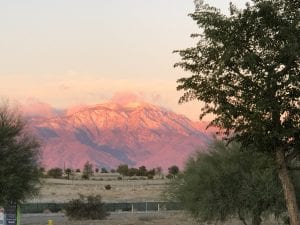
The mountains near Palm Desert taken on the last day of the Literacy Research Association annual meeting last week
It is Monday morning and I am beginning my week already tired.
I have a lingering upper respiratory infection that has been around for almost 3 weeks now, practically preventing me from two of the most important activities in my life: running and singing. I thought I was feeling better enough to do a desert trail run with my friend Jung on Thursday morning and sing with my church choir on Saturday evening, but my body has since assured me that my hubris was simply that, and I’ve been relegated to over-the-counter cough medicine, tea with honey, and a nighttime humidifier to inch towards the end of the semester.
Not being able to run, and becoming exhausted when I try to sing, has, however, reminded me of the importance of writing and reflection. There was a time, during my early academic career, when I lamented about how hard writing was and then again why writing was hard because of the internalized suppression of my writing voice, but in my journey, I’ve come to love and value writing, thriving most when I have a daily writing practice and when I make the time to write in the midst of a heavy teaching and service load. For me, reclaiming my identity as a writer has been part of humanizing this journey, allowing myself back into my work and allowing my voice to shape my teaching and research as well as my life.
So, in that spirit, I want to just take a moment to recap some of what I haven’t really made time to write about so that someday, I will look back and remember this semester.
First off, in less than 2 hours , I will (hopefully, unless it’s full) register for my first undergraduate class in almost 20 years, as I begin my journey towards reclaiming my heritage language and a lost part of my identity through a second bachelors in Chinese studies. With a lot of humility, I’ll enroll in a 4-unit Chinese 101 language class and begin that class in late January.
This journey has already been humbling. Entering as a non-traditional student, I haven’t known how or when to register or whether I would actually get into the class. Beginning this degree as an associate professor (and professional), I’ve found it really challenging (already, before the class has begun) to balance the course timing (4 hours/ week) with work commitments including conferences that I know I’ll need to attend, and search committee obligations. I’ve already had to ask for help and plan far in advance and deal with the fact that my grade may be impacted by my other life commitments. It’s made me even more empathetic as an instructor and it’s caused me pause as someone who is incredibly privileged in many ways (especially in relation to academia) and who is experiencing such challenges even before I step into a classroom.
Secondly, I have been inspired to write a somewhat fictionalized young adult memoir about losing my mom in high school. I haven’t said this out loud except to my husband, but where else better than to the whole world on my blog? I have journals that I kept of that painful year and a half between her death and my high school graduation and I think it’s an important story to tell. But, I also know that it will be hard–a different kind of hard from the rejection (and scathing critique) of reviewer 2 on an academic journal article–a personal hard. It is a type of hard that I may not have been ready to deal with until now, but I know that this is important, if only for me, and I’m committed to making it happen.
Finally, this is the first semester since I was awarded tenure and promotion to Associate Professor. Many dear friends, at the academic conferences I’ve been attending, have been asking how it is on “the other side” of the tenure review. It’s hard to answer this since I want to be helpful and hopeful, but am feeling drained, as I’ve had a heavy teaching and service load this semester and am pivoting my research trajectory to include research in newer areas for me, which means it’s going slower than I’ve hoped. I suppose the best thing that I can say about being “on the other side,” is that I no longer feel as obligated to justify or make apologies for who I am as a person, scholar, teacher or academic (although I still struggle with all of these apologies because of the environment of academia). I am working towards embracing all of who I am, imperfections, struggles and successes; tenure and promotion has allowed me to do so with more freedom and confidence.
There is joy in this struggle. And though I started this Monday morning (and this blog post) tired, I am ending the post encouraged. Making space for my humanity, for the people and activities that I love, and for reflection, always leaves me feeling humbly in awe of the life I get to lead. I am grateful in spite of my exhaustion, and exhausted in spite of my gratitude, but that is, what I suppose, makes me who I am.

So much good news!